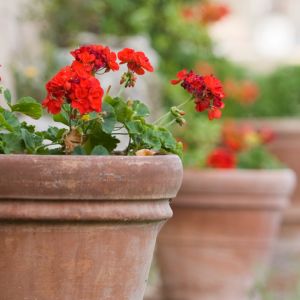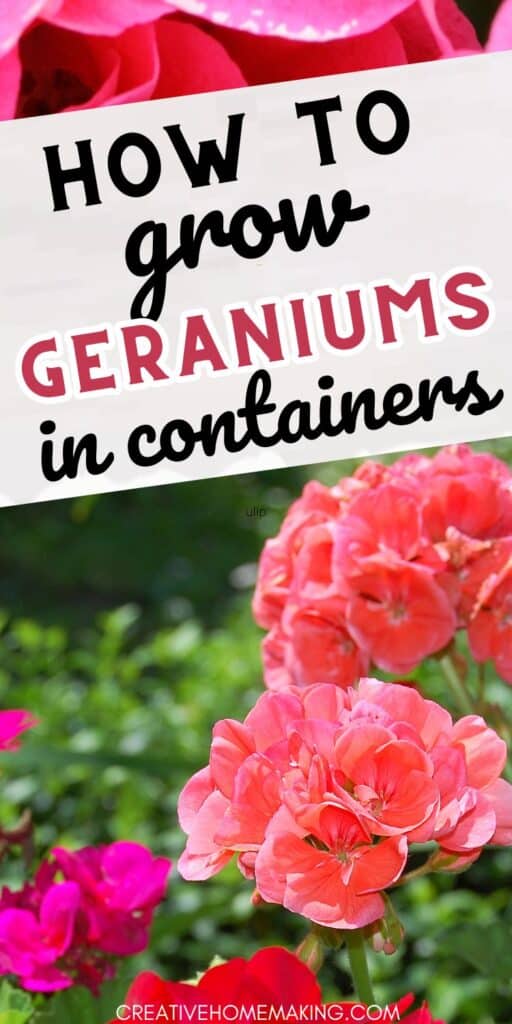Growing geraniums in containers is a great way to add color and beauty to your outdoor space, whether you have a small balcony or a large patio.
This post may contain affiliate links.
Geraniums are easy to care for and come in a variety of colors, making them a popular choice for container gardening. With the right care, your geraniums can thrive and bloom all season long.
When it comes to choosing a container for your geraniums, there are a few things to keep in mind. First, make sure the container has drainage holes to prevent water from pooling and causing root rot.
Second, choose a container that is large enough to accommodate the mature size of your geranium plant. Finally, consider the material of the container – terracotta and clay pots are porous and allow for better airflow, while plastic pots retain moisture and may require more frequent watering.
Once you have your container, it’s time to plant your geraniums. Start by filling the container with a high-quality potting mix, then gently remove your geranium plant from its nursery pot and place it in the container.
Make sure the soil level is even with the top of the container and water thoroughly. With proper care and attention, your geraniums will reward you with beautiful blooms all season long.
Related Article: How to Grow Geraniums from Cuttings
Choosing the Right Container
When it comes to growing geraniums in containers, choosing the right container is crucial for their success. Here are some important factors to consider when selecting the perfect container for your geraniums.
Container Size and Material
Geraniums can thrive in a variety of container sizes and materials. The size of the container you choose will depend on the size of your plant and how many you want to grow in one container.
It is important to choose a container that is big enough to accommodate the roots of your geraniums.
The material of the container is also important. Clay pots are a popular choice as they are porous and allow for better air circulation.
Plastic pots are also a good option as they are lightweight and retain moisture well. Whichever material you choose, make sure it is durable and can withstand the elements.
Importance of Drainage Holes
Geraniums require well-draining soil to prevent root rot and other diseases. Therefore, it is crucial to choose a container with drainage holes. The drainage holes allow excess water to escape, preventing water from accumulating at the bottom of the container.
When selecting a container, check for drainage holes at the bottom of the pot. If the container does not have any drainage holes, you can drill a few holes at the bottom to ensure proper drainage.
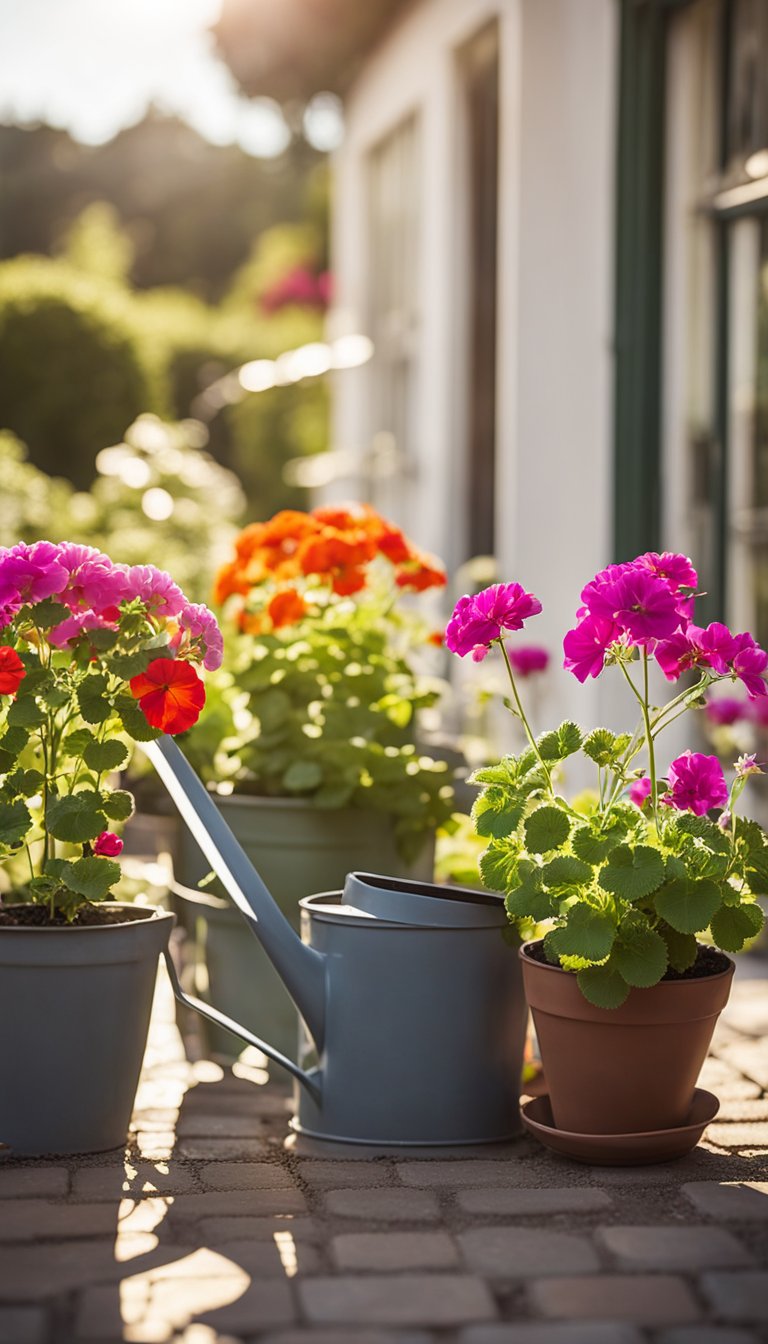
Selecting and Preparing the Soil
When it comes to growing geraniums in containers, selecting and preparing the right soil is crucial to their success. Here are some tips to help you get started.
Potting Mix Types
When selecting a potting mix for your geraniums, it’s important to choose one that is well-drained and nutrient-rich. Look for a mix that contains ingredients such as perlite, vermiculite, or sand to help improve drainage.
You can also choose a mix that contains compost or other organic matter to provide your plants with the nutrients they need to thrive.
Amending Soil for Drainage
If you’re using a potting mix that doesn’t drain well, you can amend it to improve drainage. One way to do this is to mix in some perlite or sand to help loosen up the soil.
Another option is to add some gravel or stones to the bottom of your container to create a drainage layer. This will help prevent water from pooling at the bottom of the pot and potentially causing root rot.
Remember, when selecting and preparing your soil, it’s important to choose a well-drained mix that will provide your geraniums with the nutrients they need to grow and thrive. With the right soil, your geraniums will be well on their way to producing beautiful blooms all season long.
Planting and Potting Geraniums
Geraniums are a popular choice for container gardening due to their colorful blooms and ability to thrive in a range of conditions. Here are some tips for planting and potting geraniums in containers.
Transplanting Seedlings or Cuttings
When transplanting geranium seedlings or cuttings, it is important to choose a container that is at least 6-8 inches deep and wide enough to accommodate the plant’s root system. Fill the container with a well-draining potting mix that is rich in organic matter and perlite.
To transplant the seedling or cutting, gently loosen the roots and place it in the center of the container. Fill the container with potting mix, making sure to leave enough space for watering. Firmly press down the soil around the plant to remove any air pockets.
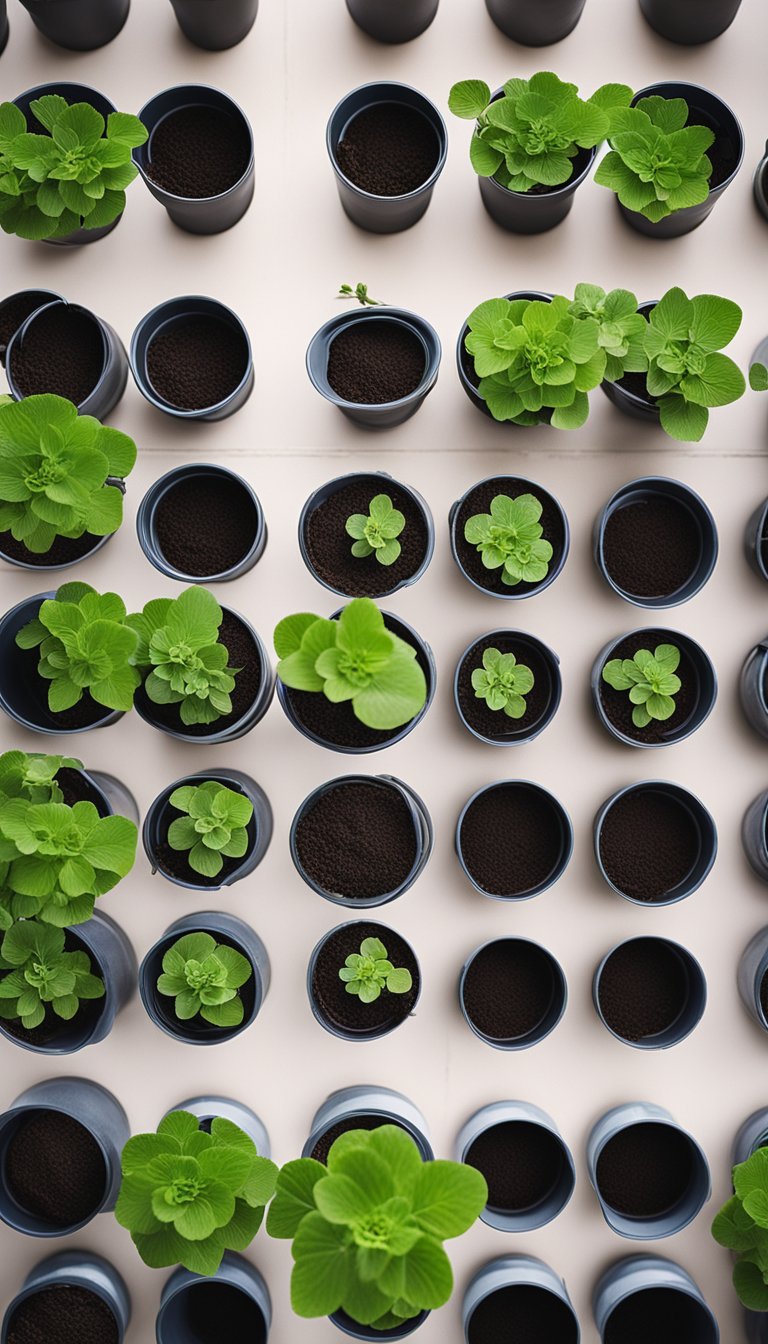
Spacing and Depth Considerations
When planting geraniums, it is important to consider spacing and depth. Geraniums should be planted at the same depth as they were in their original container.
If planting multiple geraniums in one container, make sure to space them at least 8-12 inches apart to allow for proper air circulation and growth.
Geraniums also benefit from regular repotting to prevent overcrowding and promote healthy growth. Repotting should be done when the plant has outgrown its container or the soil has become compacted.
Geranium Care and Maintenance
Growing geraniums in containers requires proper care and maintenance to ensure healthy and vibrant plants. Here are some tips to help you keep your geraniums thriving.
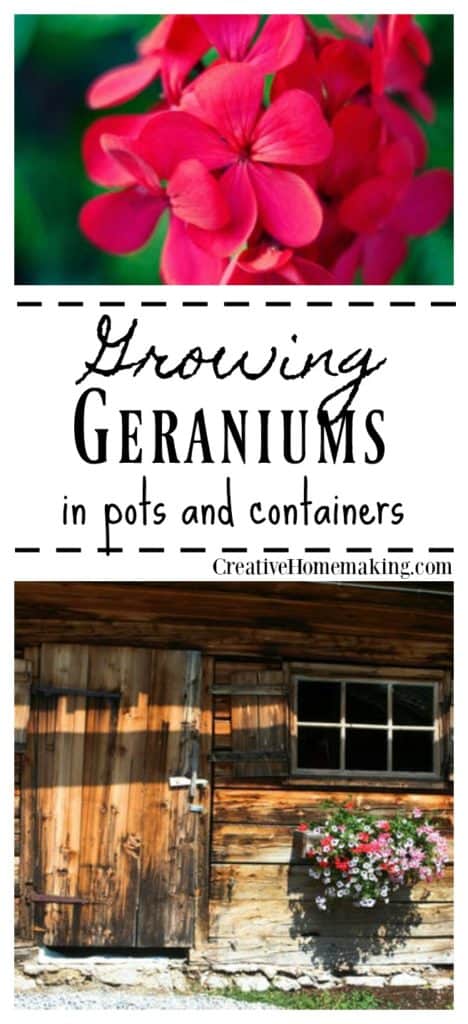
Watering Requirements
Geraniums require consistent watering to prevent the soil from drying out. Water your geraniums thoroughly when the soil surface feels dry to the touch. Be careful not to overwater as this can lead to root rot. It’s best to water in the morning to allow the foliage to dry before nightfall.
Feeding and Fertilization
Geraniums benefit from regular feeding with a balanced fertilizer. Apply fertilizer every two to three weeks during the growing season.
Be sure to follow the manufacturer’s instructions for application rates and frequency. Avoid over-fertilizing as this can lead to excessive foliage growth at the expense of flowers.
Pruning and Deadheading
Regular pruning and deadheading can help promote bushier growth and more blooms. Pinch back the tips of the stems to encourage branching and remove spent flowers to encourage continuous blooming. Be sure to use clean, sharp pruners to avoid damaging the plant.
Overwintering and Propagating Geraniums
If you’re growing geraniums in containers, you’ll need to know how to overwinter and propagate them to keep your garden looking beautiful year after year. Here are some tips to help you do just that.
Protecting Geraniums in Winter
Geraniums are sensitive to frost and cold temperatures, so it’s important to protect them during the winter months.
If you live in an area with mild winters, you can leave your geraniums outside as long as they are in a sheltered location. However, if you live in an area with harsh winters, you’ll need to bring your geraniums inside.
To overwinter your geraniums indoors, follow these steps:
- Cut back your geranium plants by about one-third.
- Dig up the plants and shake off any excess soil.
- Place the plants in a container with well-draining soil.
- Water the plants thoroughly.
- Place the container in a cool, dark location, such as a basement or garage.
- Check on the plants every few weeks and water as needed.
Methods of Propagation
Geraniums are easy to propagate from cuttings, which is a great way to create new plants without having to buy them. Here’s how to do it:
- Take a cutting from a healthy geranium plant, about 4-6 inches long.
- Remove the leaves from the bottom half of the stem.
- Dip the cut end of the stem in rooting hormone.
- Plant the cutting in a container filled with well-draining soil.
- Water the cutting and place it in a warm, bright location.
- Keep the soil moist and wait for roots to form.
- Once roots have formed, transplant the cutting into its own container.
By following these tips for overwintering and propagating your geraniums, you’ll be able to enjoy these beautiful plants year after year.
Frequently Asked Questions
What type of fertilizer should I use for geraniums in containers?
When growing geraniums in containers, it is important to use a balanced fertilizer that contains equal amounts of nitrogen, phosphorus, and potassium.
You can use a slow-release granular fertilizer or a water-soluble fertilizer. Be sure to follow the instructions on the package and avoid over-fertilizing, as this can lead to burnt leaves and other problems.
How often should I water geraniums growing in pots?
Geraniums in containers should be watered when the top inch of soil feels dry to the touch. Depending on the size of your pot and the weather conditions, this may be every few days or once a week.
Be sure to water deeply and thoroughly, allowing the water to soak into the soil and drain out the bottom of the pot.
What are the best practices for deadheading geraniums in containers?
Deadheading, or removing spent blooms, encourages new growth and prolongs the blooming period of your geraniums. To deadhead, simply pinch off the spent blooms and the stem just below the flower.
You can also remove any yellow or damaged leaves to keep your plant looking its best.
How can I overwinter my potted geraniums indoors?
To overwinter your geraniums indoors, bring them inside before the first frost and place them in a sunny window or under grow lights. Water sparingly and avoid fertilizing during the winter months. In the spring, prune back any leggy growth and repot if necessary.
What size and type of pot is ideal for growing healthy geraniums?
Geraniums prefer well-draining soil and a pot that is at least 6-8 inches deep and wide. Terra cotta pots are a popular choice as they allow for good air circulation and drainage.
Be sure to choose a pot with drainage holes in the bottom to prevent water from accumulating and causing root rot.
Do geraniums in containers require full sun, or can they thrive in shade?
Geraniums prefer full sun, but they can also grow in partial shade. If you are growing geraniums indoors, be sure to place them in a sunny window or under grow lights to ensure they receive enough light.
If you are growing geraniums outdoors, choose a spot that receives at least 6 hours of direct sunlight per day.
Related Articles
- How to Fertilize Hanging Flower Baskets
- Annuals — 5 Easy to Grow Flowers
- How to Grow Impatiens
- The Best Shade Plants for a Shady Side of a House
- Planting Guide for Hostas
- Planting Guide for Chrysanthemums
- How to Transplant Hollyhocks
Follow my gardening board on Pinterest.
